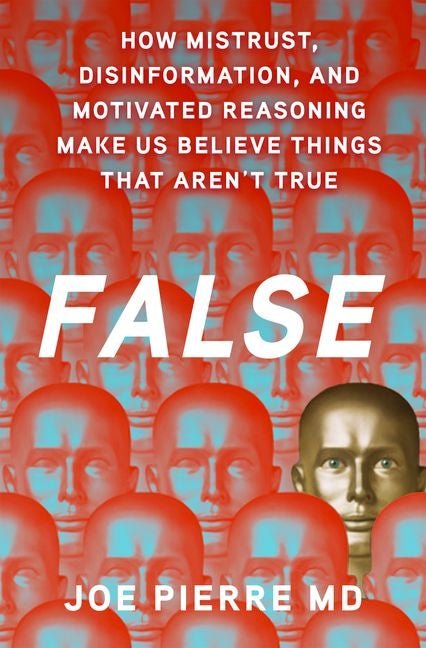Oxford University Press
False: How Mistrust, Disinformation, and Motivated Reasoning Make Us Believe Things That Aren't True
Couldn't load pickup availability
Share
Book Details
ISBN:
9780197765272
EAN:
9780197765272
Binding:
Hardcover
Pages:
256
Authors:
Joe Pierre MD
Publisher:
Oxford University Press

False provides a detailed and accessible examination of how bad beliefs can arise not only from the content of information itself but also from the ways it is obtained, presented, and interpreted. Joe skillfully unpacks the cognitive shortcuts and biases that make our brains vulnerable to misinformation, such as motivated reasoning & confirmation bias. While there are other books that explore similar terrain, False distinguishes itself through its blend of contemporary examples, ranging from viral conspiracy theories to health misinformation, and Joe’s precise, clear language that makes complex psychological concepts easy to grasp. Joe offers readers a timely and compelling guide to understanding why people so often believe things that aren’t true and what we might do about it.
When I returned to the U.S. in 2016 after years abroad, the election left me stunned. I felt like a stranger in my own country. This book helped me start to make sense of that feeling.It’s an ambitious, well-researched dive into the psychology of false beliefs—not just "their" false beliefs, but ours too. The first nine chapters explore the many ways our minds can mislead us, drawing from psychology, behavioral science, and philosophy. It’s not light reading, but it rewards the curious.What I appreciated most was the author’s compassion and balance. He reminds us often that irrational thinking isn’t limited to one political camp—it’s a human trait. The book doesn’t offer easy answers, but it does offer frameworks. I found the “three pillars” for combating false beliefs especially useful, as well as the idea that belief exists on a spectrum, not as a binary.There’s even some hope: from educational efforts like a critical thinking course at UW, to small but meaningful tech interventions—like labeling misleading posts—that actually reduce misinformation.In the end, I came away with the same unease I started with, but also a clearer understanding and a bit more optimism. If nothing else, this book reinforced one powerful truth: it’s up to each of us to question our own convictions—and stay open to change.
As a clinical psychologist, I picked up False expecting a solid read on misinformation and human psychology—but it far exceeded my expectations. Dr. Pierre does an incredible job of weaving together clinical insight, cultural commentary, and real-world examples to help us understand why people believe things that aren’t true (and why we all do it more than we realize).Many books I read in the field typically start with a few chapters of "meat and potatoes," then the rest of the chapters often present illustrations or tangents of the main points. Nothing wrong with that -- but False is meat and potatoes from beginning to end. It's a fascinating read though and through.What I especially appreciated was how he draws on his experience treating individuals with delusions to illuminate the much blurrier line between clinical false beliefs and the everyday cognitive biases we all fall into. He writes with such clarity and nuance, and there’s never a hint of judgment—just curiosity, humility, and a real desire to help readers think more critically and compassionately. He weaves relevant examples from pop-culture and history to demonstrate his points, which adds a lot of interesting color to the writing.The sections on motivated reasoning, identity and belief, and the influence of algorithms really hit home, especially in today’s climate of polarization and "fake news" fatigue. I also loved how he emphasized the importance of intellectual humility—it’s a refreshing and necessary perspective.This is one of the most relevant books I’ve read in a while, and I’ve been recommending it to colleagues, clients, and pretty much anyone who uses the internet and has opinions about anything! If you're curious about why we believe what we do—and how to believe better—False is absolutely worth your time.
This isn't a book just pointing out how "other" people have biases and false beliefs, as Joe Pierre reminds us that we all do. It's not a book "they" should read - it's a book we should all read. Dr. Pierre notes several cognitive biases of which we all need to be aware. He also provides some steps we can take to mitigate our biases, which will allow for thinking more clearly. However, he is a realist, and acknowledges that it will take a lot of effort to move past ideologies and thwart disinformation. A good book to have in your library.
This is a timeless and timely book; an absolute must-read for everyone. Dr. Pierre provides fresh insights that challenge assumptions, inform and inspire a range of essential solutions relevant to so many critical issues in today’s world.


